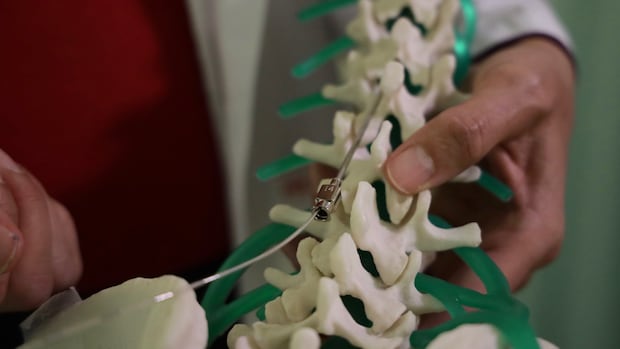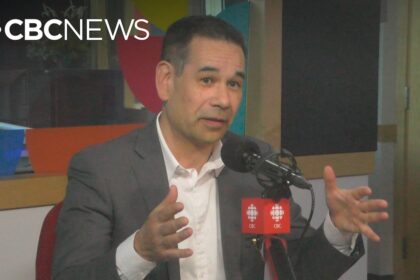ManitobaAn appeals board says Manitoba should pick up the tab for the spinal surgery a patient had in another country amid debilitating pain and intolerable wait times in the province.’Rapidly deteriorating’ condition left patient crawling but province refused reimbursement: board decisionBryce Hoye · CBC News · Posted: Nov 27, 2025 6:00 AM EST | Last Updated: 1 hour agoListen to this articleEstimated 6 minutesThe audio version of this article is generated by text-to-speech, a technology based on artificial intelligence.A patient filed a complaint with the Manitoba Health Appeal Board this year after Manitoba Health rejected their request for reimbursement for what the board considers a medically necessary spinal surgery. (Rafferty Baker/CBC)An appeals board says Manitoba should pick up the tab for the spinal surgery a patient had in another country amid debilitating pain and intolerable wait times in the province.The Manitoba Health Appeal Board suggests the patient met the criteria for urgent surgery, but resorted to paying more than $77,000 for it out-of-country last fall due to barriers they faced in the provincial health-care system, as their condition began “rapidly deteriorating.””Their health required surgery without delay…. The appellant was in a state of urgency and had lost bowel and bladder function and was being severely debilitated by their condition,” the board — an arm’s-length organization intended to provide recourse for patients unsatisfied with certain health-care related decisions — wrote in its October decision.”This situation is deeply concerning to the board.”The Manitoba Health Appeal Board met in July to review the complaint and recommended the patient be reimbursed for costs incurred for out-of-province medical services, a diagnostic procedure, accommodations and travel.In its review, published online Oct. 29, the board asks Manitoba Health Minister Uzoma Asagwara to respond within 60 days.The patient, who isn’t named in the board decision, filed the complaint after Manitoba Health denied a request for reimbursement in May.According to the board, the patient first began suffering from low back pain in 2020 due to lumbar stenosis, a condition where the narrowing of the spine can pinch blood vessels and nerves.That’s when they asked their family doctor for a referral the Manitoba Spine Clinic. That request wasn’t completed until March 2023, the board says. What makes this unique is the extreme deterioration, the severe impact on the appellant’s quality of life … and the fact that their referral took four years to address.- Manitoba Health Appeal BoardDuring the ensuing two years, the patient tried to cope through swimming as a “desperate means to alleviate the pain” while waiting on an assessment in Manitoba, the decision notes.During their first assessment appointment in March 2023, a physiotherapist advised the patient wasn’t a candidate for surgery but gave no explanation as to why, according to the appeal board.The patient was referred to a pain clinic for spinal injections, but when the pain persisted, a doctor there eventually sent them back for another assessment. Again, the patient was deemed ineligible for surgery.They had a couple more phone appointments, two steroid injections for pain and an MRI, all in April 2024. Then they were told a surgeon was open to seeing them, and to call back every two weeks until an appointment opened up. They were eventually able to book a consult for November 2024.Manitoba Health Minister Uzoma Asagwara speaks with media after question period at the legislature on Oct. 14. Their office declined to comment on specifics in the Manitoba Health Appeal Board decision, saying the department is reviewing the recommendations. (Bryce Hoye/CBC)Around that same time, in April 2024, Manitoba Health Minister Uzoma Asagwara announced $12 million for a new spinal care program to help reduce wait times.”Until now, folks living with spine pain or trauma had no other choice but to suffer for months — for years in some cases — while waiting to be seen, never mind waiting for their surgeries,” the minister said at the time.One of the NDP’s first moves after being elected in October 2023 was to shut down a surgical and diagnostic task force that sent some patients out-of-province.The Progressive Conservative government started the practice in 2022, in what it said was a temporary stopgap to help with backlogs while the province built up surgical capacity.Delays caused ‘mounting frustration’From their initial consult in early 2023 to when they left the country for surgery last fall, the patient who filed the complaint went from being able to walk to “crawling on the floor, unable to lie down for more than 15 minutes, and requiring assistance with all aspects of daily life,” the appeal board decision says.The patient explored options elsewhere in Canada. A surgeon in another province deemed spinal fusion surgery necessary but wouldn’t do it through a private clinic. A surgeon outside Canada also confirmed the patient was a candidate after reviewing their MRI results.The patient opted to have surgery outside Canada in October 2024 due to increasing pain and “mounting frustration over the delay,” the appeals board said.The board considered the case in light of what provincial health insurance legislation stipulates is allowed, including the Health Services Insurance Act, which suggests Manitobans may need the health minister’s sign-off before getting out-of-country care.The Medical Services Insurance Regulation suggests a patient may be reimbursed if they had to travel out of Canada for an “accident or sudden attack of illness,” or for a procedure the health minister or Manitoba Health agrees can’t “adequately” be performed in-province or elsewhere in Canada. In the latter case, the patient must be referred by a Manitoba-based specialist.If conditions are met, the Hospital Services Insurance and Administration Regulation suggests a patient can be reimbursed 75 per cent for hospital charges, transportation and per diems that may range from a few hundred to over $1,000 per day.Manitoba Health denied the claim on the basis that the patient didn’t receive prior approval from Manitoba Health or a Manitoba-based specialist, and did not receive confirmation that the procedure was not “adequately available” in Manitoba or Canada.In its decision, the board questioned that reading of the situation.”What makes this unique is the extreme deterioration, the severe impact on the appellant’s quality of life and mental state, and the fact that their referral took four years to address due to it being lost by their former primary care physician,” the board writes.Quoting a medical consultant for Manitoba Health, the decision says that something like loss of bowel or bladder functions, which happened in the patient’s case, would register as a “red flag” and would “elevate a case to the urgent category or emergency.”A spokesperson for Minister Asagwara said Manitoba Health is still reviewing the board’s recommendations. “Manitoba Health will respond based on the best available clinical and program guidance, in accordance with provincial legislation and policy,” the spokesperson said in a statement. ABOUT THE AUTHORBryce Hoye is a multi-platform journalist with a background in wildlife biology. He has worked for CBC Manitoba for over a decade with stints producing at CBC’s Quirks & Quarks and Front Burner. He was a 2024-25 Knight Science Journalism Fellow at MIT. He is also Prairie rep for outCBC. He has won a national Radio Television Digital News Association award for a 2017 feature on the history of the fur trade, and a 2023 Prairie region award for an audio documentary about a Chinese-Canadian father passing down his love for hockey to the next generation of Asian Canadians.Selected storiesEmail: bryce.hoye@cbc.caFacebookMore by Bryce Hoye
Wednesday, 4 Mar 2026
Canada – The Illusion
Search
Have an existing account?
Sign In
© 2022 Foxiz News Network. Ruby Design Company. All Rights Reserved.
You May also Like
- More News:
- history
- Standing Bear Network
- John Gonzalez
- ᐊᔭᐦᑊ ayahp — It happened
- Creation
- Beneath the Water
- Olympic gold medal
- Jim Thorpe
- type O blood
- the bringer of life
- Raven
- Wás’agi
- NoiseCat
- 'Sugarcane'
- The rivers still sing
- ᑲᓂᐸᐏᐟ ᒪᐢᑿ
- ᐅᑳᐤ okâw — We remember
- ᐊᓂᓈᐯᐃᐧᐣ aninâpêwin — Truth
- This is what it means to be human.
- Nokoma











